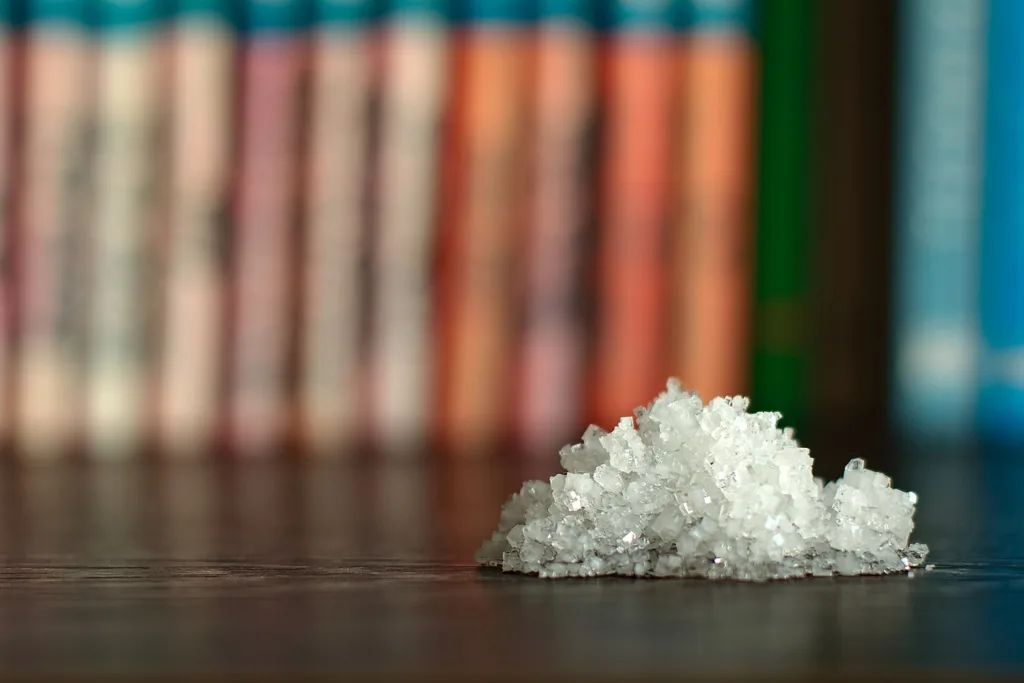Sodium chloride, also known as table salt, is a common compound that is soluble in water. The solubility of NaCl in water can be attributed to the polar nature of both the salt and the water molecules. Polar molecules have positive and negative charges on opposite sides of the molecule, making them attracted to each other.
When NaCl is added to water, the positive sodium ions (Na+) are attracted to the negative oxygen atoms in the water molecule. Similarly, the negative chloride ions (Cl-) are attracted to the positive hydrogen atoms in the water molecule. These attractions betwen the ions and the water molecules cause the NaCl to dissolve in water.
The maximum solubility of NaCl in water at 25°C is 357 mg/ml. This means that at this temperature, water can dissolve up to 357 milligrams of NaCl per milliliter of water. However, it is important to note that the solubility of NaCl in water does not increase appreciably with temperature. Even at a high temperature of 100°C, the solubility of NaCl in water is only slightly higher at 384 mg/ml.
It is also worth mentioning that NaCl is not soluble in all solvents. For example, NaCl is insoluble in nonpolar solvents such as hexane and benzene. This is because nonpolar solvents do not have the necessary electrical charges to attract the ions in NaCl.
NaCl is a compound that is soluble in water due to the polar nature of both the salt and the water molecules. The solubility of NaCl in water is not greatly affected by temperature. However, NaCl is not soluble in nonpolar solvents.
Why Is NaCl Water Soluble?
The solubility of NaCl in water can be explained by its molecular properties. NaCl is an ionic compound, meaning it is composed of positively charged sodium ions (Na+) and negatively charged chloride ions (Cl-). Water, on the other hand, is a polar molecule, with a positively charged end (hydrogen atoms) and a negatively charged end (oxygen atom).
When NaCl is added to water, the polar water molecules surround the ions and separate them from each other through a process called hydration. The positive ends of the water molecules are attracted to the negative chloride ions, while the negative ends of the water molecules are attracted to the positive sodium ions. These attractive forces overcome the ionic bond between the sodium and chloride ions, causing the NaCl to dissolve in water.
The solubility of NaCl in water is due to the attraction between the polar water molecules and the ionic Na+ and Cl- ions, wich causes the ions to separate and disperse throughout the water.

How Soluble Is NaCl?
NaCl (sodium chloride) is highly soluble in water. At room temperature (25°C), the maximum solubility of NaCl in water is 357 mg/ml, which means that 357 milligrams of NaCl can dissolve in 1 milliliter of water. This solubility is relatively high compared to oher salts and is due to the strong ionic bond between the sodium and chloride ions, which allows them to dissociate easily in water.
Interestingly, the solubility of NaCl does not increase significantly with temperature. At the boiling point of water (100°C), the solubility of NaCl is only slightly higher at 384 mg/ml. This is in contrast to many other salts, which show a significant increase in solubility as temperature increases.
The solubility of NaCl in water is 357 mg/ml at room temperature and 384 mg/ml at the boiling point of water.
Conclusion
Sodium chloride (NaCl) is a highly soluble compound in water, due to its polar nature and the presence of electrical charges on opposite sides of the molecule. The maximum solubility of NaCl in water at 25°C is 357 mg/ml, which does not increase much with temperature. However, it shoud be noted that NaCl may not be soluble in other solvents, such as nonpolar solvents like benzene or hexane. Therefore, the solubility of NaCl is highly dependent on the properties of the solvent and the temperature. Nonetheless, in the case of water, which is the most common solvent for NaCl, it is safe to say that NaCl is highly soluble.
